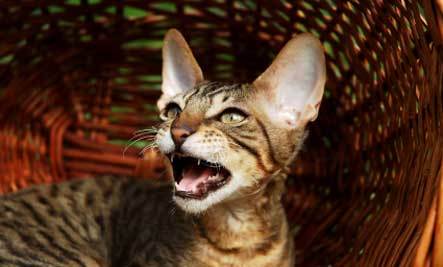Your ageing feline gets the best of care, yet she is crying out more and more, especially at night. After she has repeatedly wakened the whole family, you may wonder, “What’s up with that? Is Fluffy is getting senile?”
Sadly, geriatric cats do show signs of age-related changes in behaviour. From disorientation and shifting sleep habits to that unwelcome yowling, senior felines exhibit symptoms that researchers have likened to dementia or Alzheimer’s in humans. If your older feline has just begun her nightly serenades, you would want to know how to cope with this baffling behaviour:
What prompts the loud vocals?
A cat may howl at night for reasons that are not age-related. She could simply be responding to frustration or anxiety due to a recent move or other household change. Or she could be bored, eagerly seeking any kind of attention. If your cat is not spayed, she will grow more loudly vocal during heat cycles. Howling can also indicate illness, particularly high blood pressure or hyperthyroism, both of which can be treated with medication.
However, this behaviour is more likely to start as she ages. Senior cats (those 8 years or older) suffer any number of ills and may be in pain or expressing anxiety by meowing loudly at night. Cognitive Dysfunction Syndrome (CDS), the onset of dementia-like behavioural changes in older dogs and cats, makes cats confused or anxious. The fading of a cat’s vision or hearing are also possible triggers for nocturnal yowling.
Is it day or night?
An older cat may exhibit other signs of confusion, including going back to her empty food bowl soon after eating, apparently forgetting that she has just finished a meal. She may be distressed at being separated from you or other family members at night, when you are busy sleeping and not giving her attention.
If her hearing is impaired, she may cry out more loudly, just as a human who cannot hear well will talk louder. If her eyesight is dimming, her frustration at trying to manoeuvre around her home may cause her to howl.
In an otherwise healthy cat, such symptoms are indicators of ageing, and signs that she may suffer from CDS. She will be understandably bothered by the changes taking place in her body and brain, as CDS also affects her sleep cycle, leaving her restless and anxious. Instead of sleeping at night, she may slumber more during the day and wander the house crying at night.
Check her hearing/vision. Even if your cat sees the vet annually, the start of her nighttime howling should encourage you to get her thoroughly examined immediately. Ageing cats go through so many physical changes, and a vet checkup will pinpoint possible illnesses, including kidney or renal failure or diabetes. The right medical treatment, or a change in diet, may diminish her nightly vocalizing.
Nighttime comforts
Keeping your older cat comfortable, especially at night, may soothe her anxieties. Because older cats cannot regulate their own body temperatures as efficiently as they once did, they gravitate toward warmth. Be sure her bed is out of the path of any draft, and provide an extra blanket or two, both in her bed and on any other favourite napping spots.
If your cat’s vision is deteriorating, a nightlight will help her navigate in the dark, and a radio playing on low volume will remind her that she is not alone. Removing obstacles and keeping your home clutter-free will reduce her stress, especially if her sight and hearing are fading.
Because older cats are also are extra sensitive to humidity and heat, keep them indoors and away from conditions that could cause heatstroke. Whatever your elderly feline is coping with, giving her comfort is the kindest thing you can do.
Selected and adapted from Animal Planet




